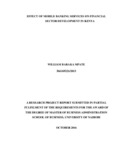| dc.description.abstract | Financial sector assumes a vital part in the financial improvement of any country. The depth of the financial sector has customarily advanced monetary development by expanding financial productivity, ventures and growth. Mobile banking is a service administered by monetary institutions in collaboration with mobile service administrators. The study sought to establish the effect of mobile banking services on financial sector development in Kenya. The study used a descriptive correlational research design. The target population for the study comprised of all 79 licensed commercial banks and micro-finance institutions in Kenya. The study used secondary data from audited financial reports of the banks and micro-finance institutions and financial performance data from CBK annual banking survey reports for the period 2006 to 2015. This comprised of quarterly values for all the study variables over the ten year period. Descriptive statistics and multivariate regression model was used to analyse data. The dependent variable was financial sector development while independent variables were ratio of mobile banking users to bank deposit account users, ratio of mobile banking transactions to total bank transactions, bank size and ratio of M2 to GDP. From the regression model, the study established that mobile banking variables influenced the development of the financial sector in Kenya. These are; ratio of mobile banking users to bank deposit account users, ratio of mobile banking transactions to total bank transactions, bank size and ratio of M2 to GDP. The study found out that the intercept was 16.101 for the all years. The four independent variables that were studied explain a substantial 89.7% of financial sector development in Kenya as represented by adjusted R2 (0.897). This implied that mobile banking services positively and significantly affects the financial sector development in Kenya. The ratio of mobile banking users to bank deposit account users had the greatest effect on financial sector development in Kenya, followed by ratio of mobile banking transactions to total bank transactions, then bank size while ratio of M2 to GDP had the least effect on financial sector development in Kenya. The study concluded that mobile banking services positively and significantly affects the financial sector development in Kenya. The study recommends the inclusion of mobile banking by strategy developers in their formulation of policies because of the technological developments and the expected switch from physical branch networks to branchless banking models. The study further recommends that commercial banks utilize, modern technological innovations such as mobile banking, agency and internet based banking services in order to be competitive. | en_US |



